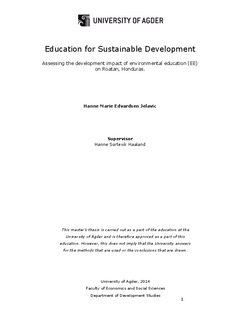| dc.contributor.author | Jelavic, Hanne Marie Edvardsen | |
| dc.date.accessioned | 2014-10-01T07:16:08Z | |
| dc.date.available | 2014-10-01T07:16:08Z | |
| dc.date.issued | 2014 | |
| dc.identifier.uri | http://hdl.handle.net/11250/222386 | |
| dc.description | Master thesis in development management - University of Agder 2014 | nb_NO |
| dc.description.abstract | This study explores the effect of environmental education for children on Roatan, Honduras. Environmental education of children is often used as a component in conservation efforts. The continuous and accelerating destruction and overuse of natural resources is a serious threat to humans, the nature and environment we depend on for our survival. There is a need to change these trends and it is believed that increased knowledge about the environmental issues, personal and societal values and attitudes towards nature are components that influence people’s behavior. The focus on educating children is based on the idea that knowledge, attitudes and behavioral changes will transfer from children to parents. Some studies support this assumed knowledge transfer, however environmental education programs must be designed specifically in order to spur this intergenerational knowledge and value transfer. It is clear that environmental education is important in order to educate and shape future environmentally friendly adults but it is also advised that some focus is given on environmental education for adults. Adults are the ones with the power to act now in order to ensure sustainable development. For this study, the case study approach was utilized, as well as mixed methods. Quantitative methods were used to measure the population’s environmental attitudes, knowledge and their motivational factors for environmentally friendly behavior. Qualitative methods were used to explore and compare people’s applied behavior to their quantitative replies. The study reveals that the environmental education programs to some extent have affected the children’s environmental knowledge and attitudes. The results also indicate that some inadvertent knowledge and attitudes transfer from children to parents can have occurred as a result of the programs. However, the programs have not caused a more environmentally responsible behavior among children or parents. The recommendations are therefore that the programs are further developed to last for a longer period of time, to be integrated in the natural science classes in school with educational material, to include action research and to promote activities that involve the parents actively. | nb_NO |
| dc.language.iso | eng | nb_NO |
| dc.publisher | Universitet i Agder / University of Agder | nb_NO |
| dc.subject | UT-503 | nb_NO |
| dc.subject | environmental education | nb_NO |
| dc.subject | conservation | nb_NO |
| dc.subject | sustainable development | nb_NO |
| dc.title | Education for sustainable development : assessing the development impact of environmental education (EE) on Roatan, Honduras | nb_NO |
| dc.type | Master thesis | nb_NO |
| dc.subject.nsi | VDP::Social science: 200::Education: 280 | nb_NO |
| dc.subject.nsi | VDP::Social science: 200::Sociology: 220 | nb_NO |
| dc.source.pagenumber | 130 p. | nb_NO |
